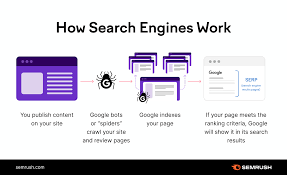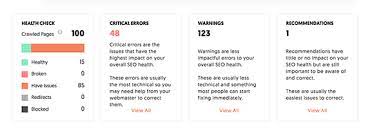The Difference Between SEO and SEA
The Difference Between SEO and SEA
Search Engine Optimization (SEO) and Search Engine Advertising (SEA) are two crucial components of digital marketing strategies aimed at improving a website’s visibility in search engine results. While both SEO and SEA share the common goal of driving traffic to a website, they differ in their approaches and implementation.
SEO: Search Engine Optimization
SEO focuses on optimizing a website’s content, structure, and technical aspects to improve its organic (unpaid) search engine rankings. By using relevant keywords, creating high-quality content, building backlinks, and ensuring a user-friendly experience, SEO aims to increase a website’s visibility in search results over time.
One of the key advantages of SEO is that it generates sustainable long-term results. Once a website achieves high organic rankings, it can continue to attract organic traffic without ongoing advertising expenditure. However, SEO requires continuous effort and monitoring to adapt to search engine algorithms and competitors’ strategies.
SEA: Search Engine Advertising
SEA involves paying for ads to appear at the top of search engine results pages. These ads are typically marked as ‘sponsored’ or ‘ad’ and are displayed based on selected keywords and bidding strategies. Unlike SEO, SEA provides immediate visibility for websites looking to attract targeted traffic quickly.
One of the main advantages of SEA is its ability to deliver instant results. By setting up ad campaigns with specific targeting parameters, businesses can reach their desired audience effectively. However, SEA requires ongoing investment as ads are displayed only when paid for, making it a more short-term solution compared to SEO.
The Relationship Between SEO and SEA
While SEO and SEA serve distinct purposes in digital marketing, they can complement each other effectively when used together. By combining organic search optimization with paid advertising strategies, businesses can maximise their online visibility and reach a broader audience across different stages of the customer journey.
Ultimately, the choice between investing in SEO or SEA depends on your business goals, budget constraints, and timeline for achieving results. Whether you prioritise long-term sustainability with SEO or immediate visibility with SEA, integrating both strategies into your digital marketing plan can help you achieve comprehensive online success.
27 Frequently Asked Questions About SEO and SEA: Understanding Key Concepts and Differences
- What does SEA stand for in SEO?
- What is SEA in e commerce?
- What is SEA in website?
- What does SEA stand for in digital marketing?
- What is SEA SEM?
- What is the difference between SCO and SEO?
- What is SEO and SEA?
- What is SEM and SEA?
- What is SEO SEA SEM?
- What is the difference between SEM and SEA?
- What is the difference between SEO SEM and SMM?
- What does sea mean in marketing?
- What is SEO vs SEA vs SEM?
- What is the SEA strategy of SEO?
- What is SEA and SEM?
- How does SEO and SEA work together?
- What is the meaning of SEO and SEA?
- Who is king of SEO?
- What are SEA strategies?
- Is SEM the same as SEA?
- What is the full form of sea in digital marketing?
- What is the meaning of SEO SEA?
- What’s the difference between SEM and SEA?
- How does SEA work?
- Why is SEO and SEA important?
- What are the 4 types of SEO?
- What is the difference between SEO and SEA marketing?
What does SEA stand for in SEO?
In the realm of digital marketing, a commonly asked question revolves around the distinction between SEO and SEA. When pondering the question, “What does SEA stand for in SEO?” it is essential to clarify that SEA refers to Search Engine Advertising. Unlike SEO (Search Engine Optimization), which focuses on organic methods to improve website visibility, SEA involves paid advertising strategies to secure prominent placements in search engine results pages. Understanding this differentiation is crucial for businesses seeking to enhance their online presence through a comprehensive blend of organic and paid search strategies.
What is SEA in e commerce?
Search Engine Advertising (SEA) in e-commerce refers to the practice of using paid advertising strategies to promote products and services within online retail environments. In the context of e-commerce, SEA involves creating targeted ad campaigns that appear on search engine results pages when users search for specific products or keywords related to the online store. By investing in SEA, e-commerce businesses can increase their visibility, attract qualified traffic, and drive conversions by strategically placing ads in front of potential customers actively searching for products they offer. This proactive approach to online advertising in e-commerce allows businesses to reach a wider audience and compete effectively in the digital marketplace.
What is SEA in website?
Search Engine Advertising (SEA) on a website refers to the practice of using paid advertising methods to promote the visibility of the website on search engine results pages. SEA involves creating targeted ad campaigns that appear at the top of search results when users enter specific keywords related to the website’s products or services. By investing in SEA, website owners can increase their online presence, attract more qualified traffic, and potentially drive conversions. This paid advertising strategy allows businesses to reach their target audience effectively and achieve immediate visibility in search engine results, complementing organic search engine optimization efforts for a comprehensive digital marketing approach.
What does SEA stand for in digital marketing?
In the realm of digital marketing, SEA stands for Search Engine Advertising. SEA involves the strategic placement of paid advertisements on search engine results pages to enhance a website’s visibility and attract targeted traffic. By bidding on specific keywords and setting up ad campaigns, businesses can effectively promote their products or services to a relevant audience. Unlike organic methods like SEO, SEA provides a more immediate and controlled way to reach potential customers through paid advertising efforts.
What is SEA SEM?
Search Engine Advertising (SEA) and Search Engine Marketing (SEM) are often used interchangeably, but they refer to slightly different concepts within the realm of digital marketing. SEA specifically focuses on paid advertising strategies to promote a website or business on search engine results pages, such as Google Ads. On the other hand, SEM encompasses a broader scope that includes both organic search engine optimization (SEO) efforts and paid advertising tactics like SEA. In essence, while SEA is a subset of SEM that deals with paid search ads, SEM encompasses a holistic approach to leveraging search engines for online visibility and traffic generation.
What is the difference between SCO and SEO?
One frequently asked question in the realm of digital marketing is: “What is the difference between SCO and SEO?” SCO, which stands for Search Content Optimization, is a lesser-known term compared to SEO (Search Engine Optimization). While SEO focuses on improving a website’s visibility in search engine results through various strategies such as keyword research and content optimization, SCO specifically emphasises the optimisation of content to enhance its relevance, quality, and engagement for users. In essence, while SEO encompasses a broader range of tactics to boost a website’s overall performance in search rankings, SCO hones in on refining the content itself to ensure it meets the specific needs and expectations of both users and search engines.
What is SEO and SEA?
When it comes to digital marketing, a common question that arises is: “What is SEO and SEA?” SEO, which stands for Search Engine Optimization, involves strategies and techniques aimed at improving a website’s organic search engine rankings. On the other hand, SEA, or Search Engine Advertising, refers to paid advertising methods that promote a website by displaying ads at the top of search engine results pages. While SEO focuses on long-term organic visibility, SEA provides immediate visibility through paid ads. Understanding the differences and benefits of both SEO and SEA is essential for businesses looking to enhance their online presence and attract targeted traffic effectively.
What is SEM and SEA?
Search Engine Marketing (SEM) encompasses various strategies aimed at improving a website’s visibility in search engine results pages. Within SEM, Search Engine Advertising (SEA) plays a crucial role in driving targeted traffic to websites through paid ads. SEA involves bidding on keywords to have ads displayed prominently in search results, marked as ‘sponsored’ or ‘ad’. By investing in SEA, businesses can achieve immediate visibility and reach their desired audience effectively. SEM and SEA are essential components of digital marketing, offering businesses the opportunity to enhance their online presence and attract valuable traffic through strategic advertising efforts.
What is SEO SEA SEM?
Search Engine Optimization (SEO), Search Engine Advertising (SEA), and Search Engine Marketing (SEM) are key terms in the digital marketing realm. SEO focuses on improving organic search rankings through content optimization and technical enhancements. SEA involves paid advertising to gain immediate visibility on search engine results pages. SEM encompasses both SEO and SEA strategies to enhance a website’s online presence comprehensively. By combining these approaches, businesses can effectively attract targeted traffic, increase brand visibility, and drive conversions in the competitive online landscape.
What is the difference between SEM and SEA?
Search Engine Marketing (SEM) encompasses a broader set of strategies aimed at improving a website’s visibility in search engine results, including both Search Engine Optimization (SEO) and Search Engine Advertising (SEA). While SEO focuses on organic methods to enhance rankings, SEA specifically refers to paid advertising tactics within SEM. Therefore, the primary distinction between SEM and SEA lies in the fact that SEM comprises both organic and paid search strategies, with SEA being a subset that involves paid advertisements to boost immediate visibility on search engine results pages.
What is the difference between SEO SEM and SMM?
When it comes to digital marketing terminology, understanding the distinctions between SEO, SEM, and SMM is key to developing an effective online strategy. Search Engine Optimization (SEO) focuses on improving organic search rankings through content optimization and link building. Search Engine Marketing (SEM) encompasses paid advertising strategies to increase visibility in search engine results pages. Social Media Marketing (SMM) involves leveraging social platforms to engage with audiences and promote brand awareness. While SEO and SEM primarily target search engines like Google, SMM utilises social media channels such as Facebook and Instagram for marketing purposes. Each of these techniques plays a unique role in enhancing online presence and driving traffic to websites, catering to different aspects of digital marketing objectives.
What does sea mean in marketing?
In the realm of digital marketing, SEA stands for Search Engine Advertising. SEA involves the practice of paying for advertisements to appear prominently in search engine results pages. These ads are strategically placed based on selected keywords and bidding strategies to target specific audiences effectively. By utilising SEA, businesses can increase their online visibility and attract targeted traffic swiftly, making it a valuable tool in enhancing brand awareness and driving conversions in the competitive digital landscape.
What is SEO vs SEA vs SEM?
When discussing SEO, SEA, and SEM, it’s essential to understand the distinctions between these digital marketing strategies. Search Engine Optimization (SEO) focuses on improving a website’s organic search engine rankings through content optimization and technical enhancements. In contrast, Search Engine Advertising (SEA) involves paid advertising to appear at the top of search results. Search Engine Marketing (SEM) encompasses both SEO and SEA tactics to enhance a website’s visibility and drive targeted traffic effectively. By utilising a combination of SEO for long-term organic growth and SEA for immediate visibility, businesses can leverage SEM to achieve comprehensive digital marketing success.
What is the SEA strategy of SEO?
The frequently asked question “What is the SEA strategy of SEO?” often arises when discussing the relationship between Search Engine Optimization (SEO) and Search Engine Advertising (SEA). In this context, the SEA strategy of SEO refers to the use of paid advertising tactics, such as Google Ads or Bing Ads, to complement organic SEO efforts. By strategically incorporating SEA into an overall SEO strategy, businesses can target specific keywords, demographics, and geographic locations to enhance their online visibility and attract targeted traffic. This integrated approach allows companies to maximise their reach across search engine results pages and effectively engage with potential customers at different stages of the buying cycle.
What is SEA and SEM?
Search Engine Advertising (SEA) and Search Engine Marketing (SEM) are often used interchangeably but refer to distinct strategies within digital marketing. SEA specifically focuses on paid advertising campaigns that appear on search engine results pages, targeting specific keywords to attract immediate traffic. On the other hand, SEM encompasses a broader scope, including both SEO (Search Engine Optimization) and SEA components. While SEA involves paid ads, SEM incorporates organic search optimization techniques alongside paid advertising efforts to enhance a website’s visibility and drive targeted traffic effectively. Understanding the nuances between SEA and SEM is essential for businesses looking to optimise their online presence and reach their target audience strategically.
How does SEO and SEA work together?
When it comes to the frequently asked question of how SEO and SEA work together, it’s essential to understand that Search Engine Optimization (SEO) and Search Engine Advertising (SEA) can complement each other to enhance a website’s overall visibility and performance in search engine results. SEO focuses on improving organic search rankings through content optimization, link building, and technical enhancements, while SEA involves paid advertising to achieve immediate visibility. By integrating SEO strategies for long-term sustainability with targeted SEA campaigns for instant exposure, businesses can create a comprehensive digital marketing approach that maximises their online presence and effectively reaches their target audience at different stages of the customer journey.
What is the meaning of SEO and SEA?
When it comes to digital marketing, understanding the meanings of SEO and SEA is essential for enhancing online visibility. SEO, which stands for Search Engine Optimization, involves strategies aimed at improving a website’s organic search engine rankings through content optimization, keyword research, and link building. On the other hand, SEA, or Search Engine Advertising, refers to paid advertising methods that display ads at the top of search engine results pages based on selected keywords and bidding strategies. Both SEO and SEA play vital roles in driving traffic to websites, with SEO focusing on long-term organic growth and SEA providing immediate visibility through paid ads. By grasping the distinctions between SEO and SEA, businesses can develop comprehensive digital marketing strategies to reach their target audience effectively.
Who is king of SEO?
The question “Who is the king of SEO?” is a common query in the digital marketing realm, often sparking debates and discussions among industry professionals. While there isn’t a definitive answer to crown a single individual or entity as the ultimate ruler of SEO, it is widely acknowledged that successful SEO strategies stem from a combination of expertise, experience, adaptability, and continuous learning. In essence, the ‘king’ of SEO could be seen as someone who consistently delivers effective results through innovative approaches, staying abreast of industry trends, and demonstrating a deep understanding of search engine algorithms to drive organic traffic and enhance online visibility for businesses.
What are SEA strategies?
When it comes to Search Engine Advertising (SEA), strategies play a pivotal role in maximising the effectiveness of paid campaigns. SEA strategies encompass a range of techniques aimed at optimising ad performance and driving targeted traffic to websites. From keyword research and selection to ad copy creation, bid management, audience targeting, and performance tracking, SEA strategies are designed to help businesses achieve their advertising goals efficiently. By implementing well-defined SEA strategies tailored to specific objectives and target audiences, businesses can enhance their online visibility, increase brand awareness, and generate valuable leads through paid search advertising channels.
Is SEM the same as SEA?
In the realm of digital marketing, a common query often arises regarding the distinction between Search Engine Marketing (SEM) and Search Engine Advertising (SEA). While SEM encompasses a broader scope that includes both SEO and SEA strategies to enhance a website’s visibility in search engine results, SEA specifically focuses on paid advertising efforts within search engines. Therefore, while SEM incorporates various techniques to improve online presence, SEA specifically pertains to paid advertisements displayed on search engine results pages. Understanding this subtle yet significant difference is essential for businesses aiming to leverage these digital marketing tools effectively to drive targeted traffic and achieve their online objectives.
In the realm of digital marketing, the term “SEA” stands for Search Engine Advertising. SEA is a paid advertising strategy that involves placing ads on search engine results pages to increase visibility and drive targeted traffic to websites. By utilising specific keywords and bidding strategies, businesses can effectively promote their products or services to a relevant audience. SEA complements other digital marketing tactics such as SEO (Search Engine Optimization) by providing immediate visibility through paid placements, offering businesses a comprehensive approach to enhancing their online presence and reaching potential customers.
What is the meaning of SEO SEA?
When people ask about the meaning of SEO SEA, they are typically inquiring about the difference between Search Engine Optimization (SEO) and Search Engine Advertising (SEA). SEO focuses on improving a website’s organic search rankings through content optimization and technical enhancements, while SEA involves paid advertising to appear at the top of search engine results. Understanding the distinction between SEO and SEA is essential for businesses looking to enhance their online visibility and attract targeted traffic effectively. By utilising both strategies strategically, businesses can maximise their digital marketing efforts and reach a broader audience across various online platforms.
What’s the difference between SEM and SEA?
Search Engine Marketing (SEM) encompasses both Search Engine Optimization (SEO) and Search Engine Advertising (SEA). While SEO focuses on improving organic search rankings through content optimization and technical enhancements, SEA specifically refers to paid advertising campaigns on search engines. In essence, SEM is the broader term that includes both organic and paid strategies to enhance a website’s visibility in search engine results. Therefore, while SEM covers the overall digital marketing efforts for search engines, SEA is a subset that specifically pertains to paid advertising initiatives.
How does SEA work?
Search Engine Advertising (SEA) operates by allowing businesses to create targeted ads that appear at the top of search engine results pages based on selected keywords and bidding strategies. When a user enters a query matching the chosen keywords, the search engine displays these paid ads prominently, marked as ‘sponsored’ or ‘ad’. Advertisers bid on keywords relevant to their products or services, and the ads are shown to users who are actively searching for related information. By leveraging SEA, businesses can reach their target audience effectively and drive immediate traffic to their websites through paid placements in search results.
Why is SEO and SEA important?
In the realm of digital marketing, both SEO and SEA play pivotal roles in enhancing a website’s visibility and driving targeted traffic. SEO (Search Engine Optimization) is crucial as it helps improve organic search rankings, making a website more discoverable to users searching for relevant information or products. On the other hand, SEA (Search Engine Advertising) allows businesses to achieve immediate visibility by placing ads at the top of search engine results pages. Together, SEO and SEA work hand in hand to boost online presence, increase brand awareness, attract potential customers, and ultimately drive conversions. By prioritising both SEO and SEA strategies, businesses can establish a strong online presence and stay competitive in the ever-evolving digital landscape.
What are the 4 types of SEO?
When it comes to Search Engine Optimization (SEO), there are four main types that businesses often focus on to improve their online visibility and search engine rankings. These include on-page SEO, off-page SEO, technical SEO, and local SEO. On-page SEO involves optimizing individual web pages with relevant content, meta tags, and keywords. Off-page SEO focuses on building backlinks and increasing a website’s authority through external sources. Technical SEO deals with the technical aspects of a website, such as site speed, mobile-friendliness, and structured data markup. Lastly, local SEO targets geographically specific searches to enhance a business’s presence in local listings and maps. By understanding and implementing these different types of SEO strategies effectively, businesses can enhance their online presence and attract more organic traffic.
What is the difference between SEO and SEA marketing?
When it comes to digital marketing, a common question that arises is the distinction between SEO (Search Engine Optimization) and SEA (Search Engine Advertising). SEO focuses on improving a website’s organic search engine rankings through strategies like keyword optimization, content creation, and link building. On the other hand, SEA involves paid advertising to display ads at the top of search engine results pages based on selected keywords and bidding strategies. While SEO aims for long-term sustainable results, SEA provides immediate visibility but requires ongoing investment. Understanding the nuances between SEO and SEA marketing is essential for businesses looking to enhance their online presence effectively.









